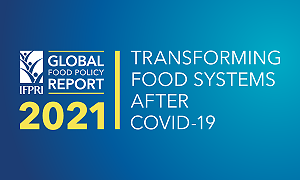Over the past two decades, social protection programs have become a mainstream policy tool to address chronic poverty and food insecurity in low- and middle-income countries (LMICs).
Search
Global and national agrifood systems are vulnerable to a variety of shocks that have caused major disruptions to food production, markets, and livelihoods over the past two decades, and have set back efforts to reduce poverty, food insecurity, and
Regional developments: Central Asia
Central Asia faced unprecedented challenges in 2020 as the global pandemic compounded existing problems facing the region.
Regional developments: Central Asia [in Russian}
В 2020 году страны Центральной Азии столкнулись с беспрецедентными вызовами, поскольку глобальная пандемия усугубила существующие в регионе проблемы.
2021 Global food policy report: Transforming food systems after COVID-19: Synopsis [in Chinese]
2020年在诸多方面都让我们始料未及。新冠肺炎(COVID-19)疫情为全球带来了一场大规模的公共卫生灾难,各国均陷入了疫情及其相关应对政策带来的不同程度的经济困境,面临服务严重中断和人员流动严重受限的局面。无论是富裕国家还是贫穷国家,均未能幸免。在中低收入国家,许多弱势群体直接面临食物安全、医疗和营养方面的威胁。丧失生计、营养不良、教育中断和资源枯竭造成的长期影响可能性非常巨大,特别是对许多国家来说,距离新冠肺炎疫情的结束还遥遥无期。
The coronavirus pandemic has upended local, national, and global food systems, and put the Sustainable Development Goals further out of reach. But lessons from the world’s response can help address future shocks and contribute to change.
Food systems need to be transformed if we are to meet the Sustainable Development Goals and increase resilience of these systems to shocks. The pandemic has provided useful lessons on opportunities and weaknesses that must be addressed.
The coronavirus pandemic has upended local, national, and global food systems, and put the Sustainable Development Goals further out of reach. But lessons from the world’s response can help address future shocks and contribute to change.
Toward inclusive food systems: Pandemics, vulnerable groups, and the role of social protection
Vulnerable groups have been most affected by disruption to food systems, such as lockdowns, through loss of employment and incomes. Social protection has a key role to play in times of health and economic shocks.
2021 Global food policy report: Transforming food systems after COVID-19: Synopsis [in Arabic]
Abstract Text Here
2021 Global food policy report: Transforming food systems after COVID-19: Synopsis [in Russian]
2020 год был во многом беспрецедентным.
L’année 2020 a été une période inédite à bien des égards.
Regional developments
As the coronavirus pandemic reached every corner of the world, countries responded rapidly with an array of policies to stop it, and then with social and economic policies to protect food security, incomes, and livelihoods.
El año 2020 fue un año sin precedentes en muchos sentidos.
Redesigning food systems to be inclusive of poor and vulnerable people is a moral imperative.
Ensuring that women’s contributions to food systems are recognized—by their families, communities, policymakers, and society more broadly—and that women can make strategic choices about their involvement in food systems has benefits for all of soc
Poverty, hunger, and malnutrition: Challenges and breakthroughs for rural revitalization
The first two Sustainable Development Goals call to end poverty, hunger, and malnutrition by 2030. This chapter looks at trends in rural poverty, hunger, and malnutrition, and the potential to put the world on course to meet these SDGs.
2017 год был отмечен ростом неопределенности на фоне неоднозначных признаков прогресса.
The year 2017 was marked by increasing uncertainty amid mixed signs of progress. The world enjoyed a strong economic recovery, but global hunger increased as conflicts, famine, and refugee crises persisted.
2017年,全球在取得不同方面进展的同时,各种不确定因素亦日趋增加。尽管世界经济复苏强劲,持续的冲突、饥荒及难民危机却导致全球饥饿人口增加。同时,在反全球化思潮的冲击下,全球格局呈现出复杂多变的态势,国际贸易和投资以及人口与知识的流动均受到阻碍。虽然在过去几十年里全球一体化加速推进了消除贫困和营养不良的进程,然而随着美国从多项重要国际协议中退出、英国退欧以及许多国家反移民言论的抬头,全球一体化进程开始出现倒退。

